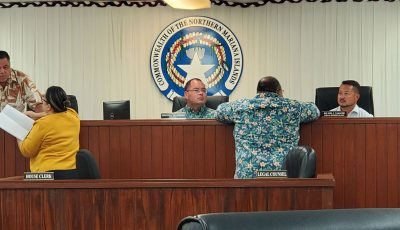‘NPS report reveals military’s ‘blatant disregard’ for EIS commitments’
The National Park Service report this month accusing the Department of the Navy of ignoring stipulated agreements between the CNMI and the military and its earlier commitments to historic preservation plans in its live-fire training plans on Tinian has drawn the concerns of the respective chairs of the House and Senate committees on federal agencies or relations.
Rep. Angel Demapan (R-Saipan), chair of the House committee federal Relations & Independent Agencies, and Sen. Arnold Palacios (R-Saipan), chair of the Senate committee on Federal & Foreign Affairs, said the report leaves some questions that need to be answered by the Department of Defense and casts doubt on future assurances the military might give to “mitigate” the impacts of the planned live-fire project.
“The NPS report reveals very troubling revelations pointing to the Navy’s blatant disregard for what was contained in earlier EIS agreements,” Demapan told Saipan Tribune. “The action of the Navy certainly does not set good precedent for future promises or mitigations. In fact, their latest action is an indication that the concerns of our community do not really matter to them.”
According to the Park Service’s report, the Navy appears to have ignored its earlier assurances to enhance the Tinian historical district based on its historical findings and recommendations. This assurance was stipulated in a 2011 programmatic agreement between Guam, the CNMI, and the Department of Defense for earlier environmental impact studies for the “Guam Buildup” project and states that: “DOD will coordinate with the NPS to update the Tinian NHL historic district, based on the results of” the Navy-sponsored historical studies.
However, the Park Service, in its report, said this has not been addressed.
In May 2010, the Navy completed a study that identified zones for “resource protection” and military “activity mitigation,” among others, to “strike a balance between” stewardship and military training.
The Park Service argues that—given the geographic overlap between areas of potential effect in the earlier project and the live-fire training ranges in question—the military’s live-fire alternatives “should have been informed by the findings and recommendations” that the Navy adopted in its earlier project.
“This clearly did not occur in a meaningful way,” the Park Service said. “…Not only are the training constraint area[s]” and report recommendations “seemingly ignored by the CJMT proposed undertaking, some of the most significant impacts to historic and cultural resources would occur in training constraint areas, the Interpretation Zone, and/or would result from actions that go against” the Navy’s own findings.
“I don’t see how the Navy could simply backtrack on its own studies and previously approved historical protection and mitigation zones,” Demapan said, when drawn to this concern. “The Navy’s action is yet another cause for the erosion of public confidence in the military proposals being forced upon our islands.”
For his part, Palacios said that if the military ignored plans on historic preservation, “what else are they ignoring?” “Is this the only issue they ignored in the EIS? We should be a little bit more vigilant in what comes out to make sure” that this does not happen.
Palacios commended and thanked NPS and the Advisory Council on Historic Preservation for completing the study. “…There is a still a lot of work to do to address the historic preservation and site issues. I hope the Department of Defense goes back and address some of those major issues. For sustained live-fire [training], it’s obvious it is going to have an impact on those sites.”



























